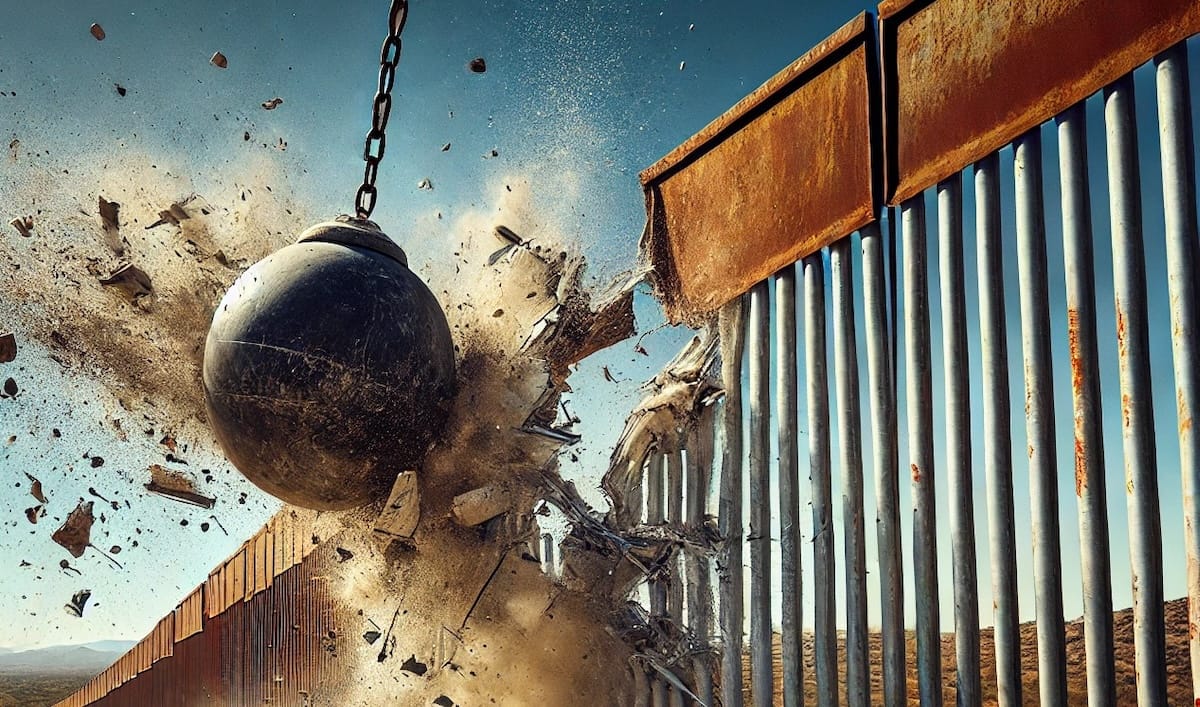
When we abolished borders
After a while, it was hard to remember why we'd drawn the lines to begin with.
In the twilight of the 21st century, humanity was staring into the abyss of declining birthrates.
For the first time since the Industrial Revolution, our numbers as a species were declining every year. Capitalist economies premised on the assumption of infinite growth couldn't cope. Stock markets stagnated, inflation surged out of control. Governments had belatedly tried to address the problem, but every means of encouraging people to have kids—longer parental leave, tax breaks, cash payments, religious scolding—had failed.
Rural villages were emptying out, becoming ghost towns. Grass and weeds pushed up through cracked pavement in silent streets. Abandoned cars decayed on the roadside. Vacant houses were overgrown with vines, dry leaves and birds' nests. Trees sprouted like the vanguard of an invading army as forests spread and reclaimed the urban areas humanity had ceded.
Thanks to better technology, productivity was increasing, but not enough to keep pace. There were shortages, empty shelves, and long waits for service. Jobs went unfilled for lack of labor. Bridges and rails rusted, paint peeled, roofs collapsed, electric wires came down. Farmland reverted to wilderness as fallen fruit rotted on the ground and thorny brambles choked out crops.
At the same time, people in the tropics were suffering. We'd completed the green transition and phased out fossil fuels, but too late to stave off the damage. The immense burden of climate change fell heaviest on poor countries, those least equipped to deal with it. There were deadly heat waves, droughts and dust storms. Irrigation canals ran dry, rivers were reduced to trickles over beds of cracked mud, and crops withered in the fields. Mega-typhoons smashed the coast and swamped cities.
We had effectively split one solution into two problems.
The arguments dragged on for years—anguished editorials, screaming tabloid headlines, picketers and protests fired by xenophobic rage. Politicians ran for office promising the impossible—every border a fortress defended by barbed wire and machine guns, walling out the world at any cost—and a few of them won. Some ethnostates resisted to the bitter end.
But the logic of necessity couldn't be denied forever. Finally, grudgingly, we reached an agreement on what had to be done.
The border guards stepped down from their posts. Guard towers were left unmanned. The shabby, never-finished walls were pulled down to cheers.
It would later be called Boundless Day.
Passports became a thing of the past. From that day on, the Earth was held in common trust. Everyone could live and work where they chose. The old national borders still appeared on maps, but only as archaic curiosities.
There was friction, of course. Cities swelled overnight, putting stress on aging infrastructure. Trains and buses were jam-packed, and highways were swamped with traffic. Rents shot up, and and rickety slums sprang into being where regular housing couldn't be built fast enough.
There were new cultures, new tongues, new faiths cheek-by-jowl with the old. Some resisted melting together. Both old-timers and newcomers often retreated into their own enclaves, trying to interact with each other as little as possible. There were hurt feelings born from misunderstanding, shouting matches, brawls, and hate crimes. Conservatives grumbled that the good old ways were dying and the immigrants were to blame.
But even the fiercest critics of the borderless world couldn't deny the benefits. The influx of people was a jolt of new vitality in those once-dying small towns. Stores that had long been shuttered held grand reopenings. The economy boomed. Businesses couldn't hire fast enough, becoming fountains of cash for owners and workers alike. Train whistles sang again at the crossings. Community centers that had been dark and dusty rang with light and noise. Once-empty streets found new life as bustling pedestrian malls, parks and public plazas.
It benefited the immigrants' home regions, too. The remittances they sent home helped support their families, building new infrastructure and paying to import scarce goods. Those who stayed behind, with more space to maneuver, had an easier time adapting to the challenges of global warming.
Last but not least, the planet thrived from humanity's great reshuffling. People moved where they wanted to live, and the rest of the world was allowed to rewild. Nature had long been under our thumb, but our measured retreat allowed it to spring back.
Wilderness corridors spread and linked together, giving animals safe paths to migrate. Endangered species recovered from the brink. Rivers raced through majestic mountain ranges, oceans sparkled with leaping schools of fish, and cathedral trees towered in renewed forests. We gave back the wetlands and barrier islands that had long protected us from storms and were eager to do so again. It would take centuries for the planet to regenerate from the damage we'd wrought, but that long healing had finally begun.
Like many social changes, once people got used to the borderless world, it proved to be such a sensible idea that we wondered what the fuss had ever been about. We realized it had never made sense to carve up humanity with arbitrary legal lines, to chain people to one patch of ground or foreordain their future based on accidents of birth.
Politicians had to try harder to serve the needs of the population, knowing that people could pack up and move en masse if they didn't like how they were being governed. As cultures mixed and mingled, new hybrids were born: new fusion cuisines, new polyglot tongues, new syncretist festivals. There were exuberant outbursts of art and creativity. People who had been separated by canyons of mutual incomprehension came to understand each other a little better. The world got a little wiser and a little kinder, one turning at a time.
